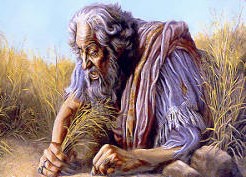All too often, men see themselves as the centre of the universe. ‘Pride comes before a fall’ says the proverb, but why is it so harmful, and should we try to eliminate it? One definition of pride comes from Augustine: “The love of one’s own excellence”. In this sense, the opposite of pride is humility. Pride is sometimes viewed as healthy or as a virtue, but in the present context, it is a vice, an excessively high opinion of oneself, haughtiness, spiteful, or disdainful conduct or the arrogant treatment of others.
Since we all make mistakes, why does it seem so difficult to admit making a mistake? For one thing, we may be trying so hard not to make a certain mistake that when we do, we dislike admitting it even to ourselves. Who does not make mistakes? No human is infallible. Old and young, rich and poor, men and women, one and all are imperfect, and so make mistakes.
Doubtless in many cases the reason is pride. Admitting a mistake reflects on things we may take pride in, such as our knowledge, our skill or our carefulness. We want to have a good appearance in the eyes of others.
Without doubt a very telling reason why it is difficult at times to admit making a mistake is the blame, censure or punishment that may come because of having made a mistake, as when one causes a serious accident. Because of the shame that goes with making a mistake the tendency is to pin the blame on others. But if we can recognize why friends, family, acquaintances, or individuals we read about acted unwisely, it can help us to avoid the same pitfall.
In the Bible book of Daniel is an account of the king of Babylon, Nebuchadnezzar. Addressing him, Daniel said: “O king, because you have grown great and become strong, and your grandeur has grown great and reached to the heavens, and your rulership to the extremity of the earth..let the heart of a beast be given to you, vegetation they will give to you, to eat grass just like bulls..”
At the time of his disturbing dream, Nebuchadnezzar held world domination. He was to be driven from his throne into the field to eat grass like bulls. But, his kingdom was to be held for him until he had spent “seven times” or seven years out in the grassy field like a bull, in humiliation.
This prediction actually befell King Nebuchadnezzar one year later. Nebuchadnezzar was seized with madness, probably the condition known as lycanthropy. Instead of behaving as king, he went out into the field to eat grass. His throne however, was not taken by a usurper, but was held for him by God’s power until his return after “seven times” or seven literal years. When restored to his throne, he acknowledged God as Universal Sovereign and said: “His rulership is a rulership to time indefinite and his kingdom is for generation after generation. And all the inhabitants of the earth are being considered as merely nothing, and he is doing according to his own will.. and there exists no one that can check his hand or that can say to him, ‘What have you been doing?’” He further stated: “Those who are walking in pride he is able to humiliate.” (Daniel 4:19-37).
Of course, admitting we made a mistake is the right, honest and decent thing to do. But it is more than that. It is also the course of wisdom. For one thing, admitting to having made a mistake is a lesson in humility. This, on the one hand, protects us from the snare of pride, with its irrational quality and stubborn tenacity which is ever ready to entrap us. And, on the other hand, the humbling experience of admitting we made a mistake may well serve to make us more careful so that we will be less likely to make that same mistake again. Admitting to making a mistake is the course of wisdom in that it builds in us strength and self-respect. Failure to do so is cowardly, and serves to weaken us morally, making it likely that we will continue to make the same mistake. If we deliberately, or otherwise, cause others to doubt themselves, if we willingly allow others to feel inferior, or that it is their fault that the error you created occurred, that is wrong.
Further, admitting a mistake makes for better relationships. When we refuse to admit we have made a mistake, we outrage the judgment of others; and they will conclude that we are either too proud, too dishonest, or too stupid to recognize that we were in the wrong; all of which may well cause a barrier to come between us and those closest to us. Then, again, if we are willing to admit we made a mistake we will find ourselves more ready to sympathize with others when they make mistakes.
The Latin phrase Omnia Vanitas (“All is Vanity”), is from the Latin translation of the Bible book of Ecclesiastes. Although that phrase, itself originally referred not to obsession with one’s appearance, but to the ultimate fruitlessness of man’s efforts in this world, the phrase summarizes the complete preoccupation of the proud individual solely concerned with their own advancement.
Yes, in addition to the fact that to admit having made a mistake is the honest thing to do, it is also the wisest. It helps to keep us humble. It also helps us to keep our self-respect and makes for stronger, closer relations with others.